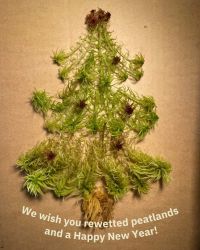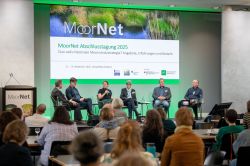News
2025
🎵 We wish you rewetted peatlands
by Berit Krondorf (comments: 0)
… and a Happy New Year!

22/12/2025 This is our peatland twist on the classic Christmas jingle. We send it to all peatland lovers and hope for it to become as true as possible in 2026.
As 2025 comes to a close, we want to thank all our friends, followers, and partners for your support of the Greifswald Mire Centre. Together, we’ve made strides in peatland protection, research, and advocacy. Here’s to even more impactful collaborations and dedicated peatland action in 2026! ✨
Paludiculture Newsletter
by Berit Krondorf (comments: 0)
Fresh issue

17 December 2025 The new Paludiculture Newsletter 4|2025 is here! These are our topics:
- Cuddling with peatland: Artist Daniel Hengst creates textile peatland plants that embody paludiculture
- Peatlands post-COP30: What was achieved for peatlands at the World Climate Conference in Belém and what are the prospects for upcoming COPs? Assessments by Franziska Tanneberger
- From peatland to market: Clemens Kleinspehn analyses the environmental impact of a paludiculture product over its entire life cycle. Why this is important? Read the interview!
- Anti-mud mats from peatlands – paludiculture biomass helps at the Wacken Festival
- Sneak peek at PaludiScout: The central platform for specialised technology for managing wet areas will launch soon.
- Opening: The Peatland Library in Greifswald now has a new home – find out more about this repository of knowledge and meeting place.
Plus: more topics and current dates in the event calendar!
We enjoy staying in touch with our readers. What topics would you like to see covered in the Paludiculture Newsletter, and what feedback do you have for us? Feel free to email us at communication@greifswaldmoor.de.
New resilience check for Germany
by Berit Krondorf (comments: 0)
with paludiculture and agrivoltaics/peatland PV
11/12/2025 In its latest resilience dossier, the Office of Technology Assessment at the German Bundestag (TAB) informs members of parliament about possible developments in ‘water management in agriculture’ in future scenarios up to 2050. It also covers the potential of new forms of use, such as agrivoltaics, peatland-photovoltaics and paludiculture on rewetted and previously drained agricultural land (link to the dossier in german).
The dossier considers agrivoltaics and peatland PV to be particularly promising. It states that partial shading by PV modules could reduce evaporation and thus conserve water resources. Furthermore: ‘For peatland-photovoltaics (peatland PV) ... an estimated technical potential of 440 to 880 GWp is assumed in Germany. This corresponds to approximately four to eight times the photovoltaic capacity currently installed in Germany and illustrates the enormous energy potential of this use.’ However, our knowledge of the effects of peatland PV is still limited, and further research is needed before large-scale implementation can be recommended. Projects such as MoorPV and MoorPower are currently conducting research about it.
The dossier assesses paludiculture as follows: ‘Agriculture on rewetted peatland areas with peat conservation, known as paludiculture, therefore still occupies a niche position ... However, this could change by 2050 due to the great potential for climate protection.’ Prof. Dr. Gerald Jurasinski, Carl Pump and Dr. Wendelin Wichtmann contributed their expertise to the dossier.
About the resilience dossiers:
The resilience check and the resulting dossier are a consulting service for the German Bundestag and serve as background information for specialist committees, as well as for social actors and the public. It analyses the potential of scientific and technological developments and discusses their possible impact on society. It discusses on an infrastructure-related topic each year. The 2026 edition of the Resilience Check will concentrate on ‘Cybersecurity in Research’.
Our post-COP30 peatland series
by Berit Krondorf (comments: 0)
What about outcomes and perspectives?
28/11/2025 In our short post-COP30 peatland series we’ve asked FranziskaTanneberger for commenting with experiences from the ground as a member of the German delegation in Belém.
High on the agenda: the “Peatland Breakthrough” at the 17th November – a global call to action by a strong peatland partnership, including Greifswald Mire Centre. Why it wasn’t the breakthrough itself yet, but rather a pre-launch publishing the Science-based Framework for Global Peatland Targets & Guiding Principles, Franziska explains in this video: COP30 Series – Part 6: #Peatland Breakthrough – not yet, but... .
Nevertheless, the side event was a considerable success: Germany joined Peru and Uganda in being a Champion Country for the Peatland Breakthrough, which is a collaborative effort to accelerate and mobilize action to conserve, rewet and restore, and enable the sustainable, wise use of the world’s peatlands.
Also, Franziska Tanneberger stresses that science-based targets for peatlands Included of the official Outcome Report of the Global Climate Action Agenda at COP 30 | UNFCCC of COP30 is an encouraging outcome. Find peatland content there on p. 18 and hear more about it in this video: COP30 Series - Part 4: COP 30 Outcome
There is peatland perspective for the upcoming COPs: the next global climate summit (UNCCC) will take place in Antalya/Turkey – under Australian leadership. Of course, the country doesn’t sport as much peatlands as Brazil – the tropical country with the largest area of peatlands – but there is a lot of activity on these ecosystems especially in neighbouring Caucasian countries. And also the next meeting of the Convention on Combatting Desertification (UNCCD) in Ulan Bataar/Mongolia is likely to have a focus on peatlands. More details in:COP30 Series - Part 5: #COP30 Preview next COP
More details about peatland events on COP30 with involvement of Greifswald Mire Centre in this media information of Greifswald University.
MoorNet conclusion
by Berit Krondorf (comments: 0)
with useful outcomes

18/11/2025 Since 2022, MoorNet has been providing technical support as a research and development project for the implementation of the National Peatland Protection Strategy (Nationale Moorschutzstrategie) and networking amongst peatland protection stakeholders in Germany. With useful outcomes that are still publicly available:
The MoorNet project database provides information on projects, funding and institutions. New projects can be registered there using this form.
The MoorNet mailing list sends latest news on peatlands, and those interested can still register online.
The MoorNet final conference in mid-November 2025 demonstrated the wealth of expertise, commitment and experience within the German peatland conservation community. Over three days, more than 150 participants from administration, practice and science shared knowledge, exchanged experiences, discussed problems and debated solutions. An excursion to a rewetting project in Brandenburg completed the programme. Presentations and selected contributions from the conference will soon be published as videos at the MOORNet-Website – for anyone who would like to delve deeper into the content or review it.











